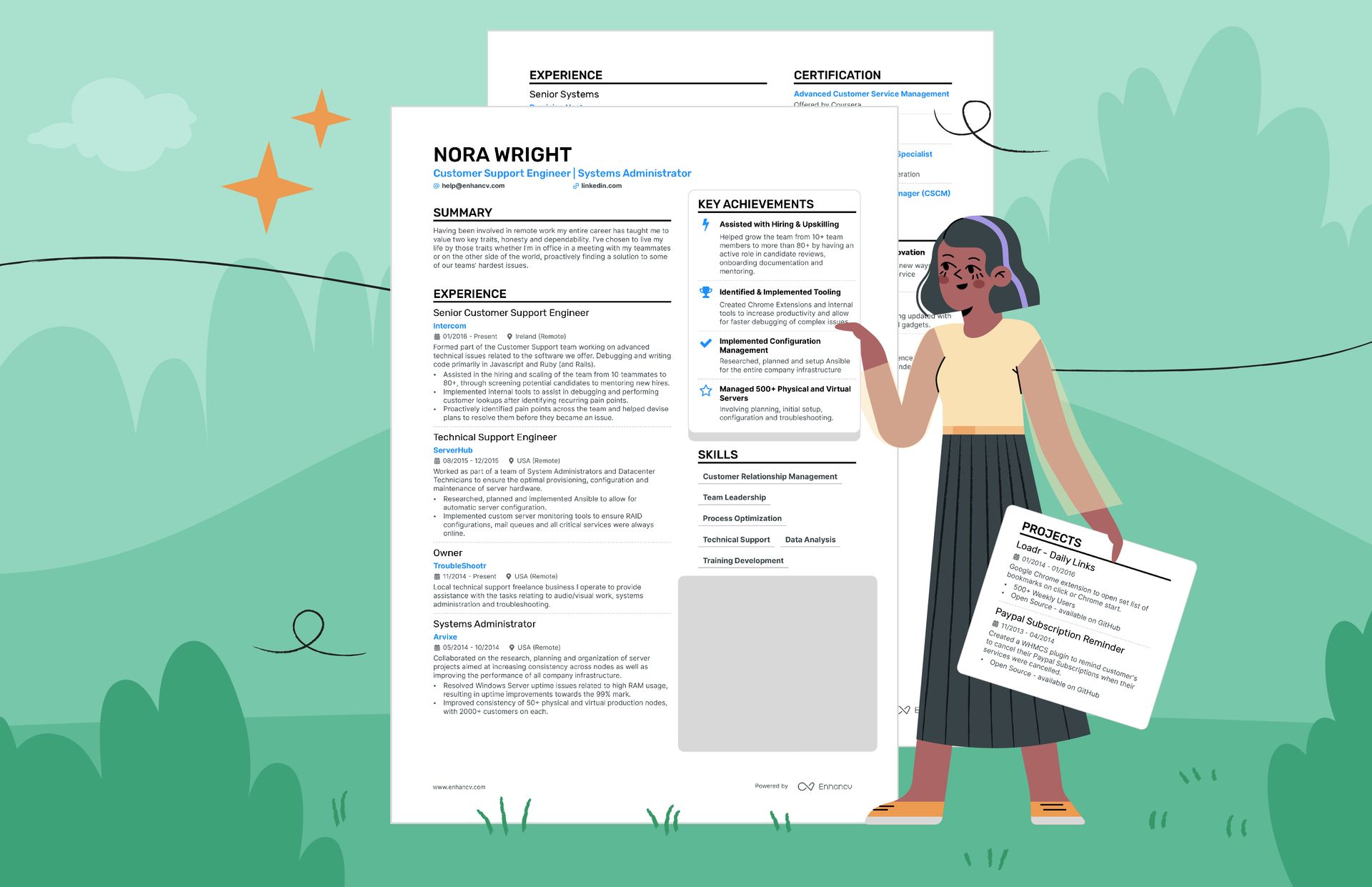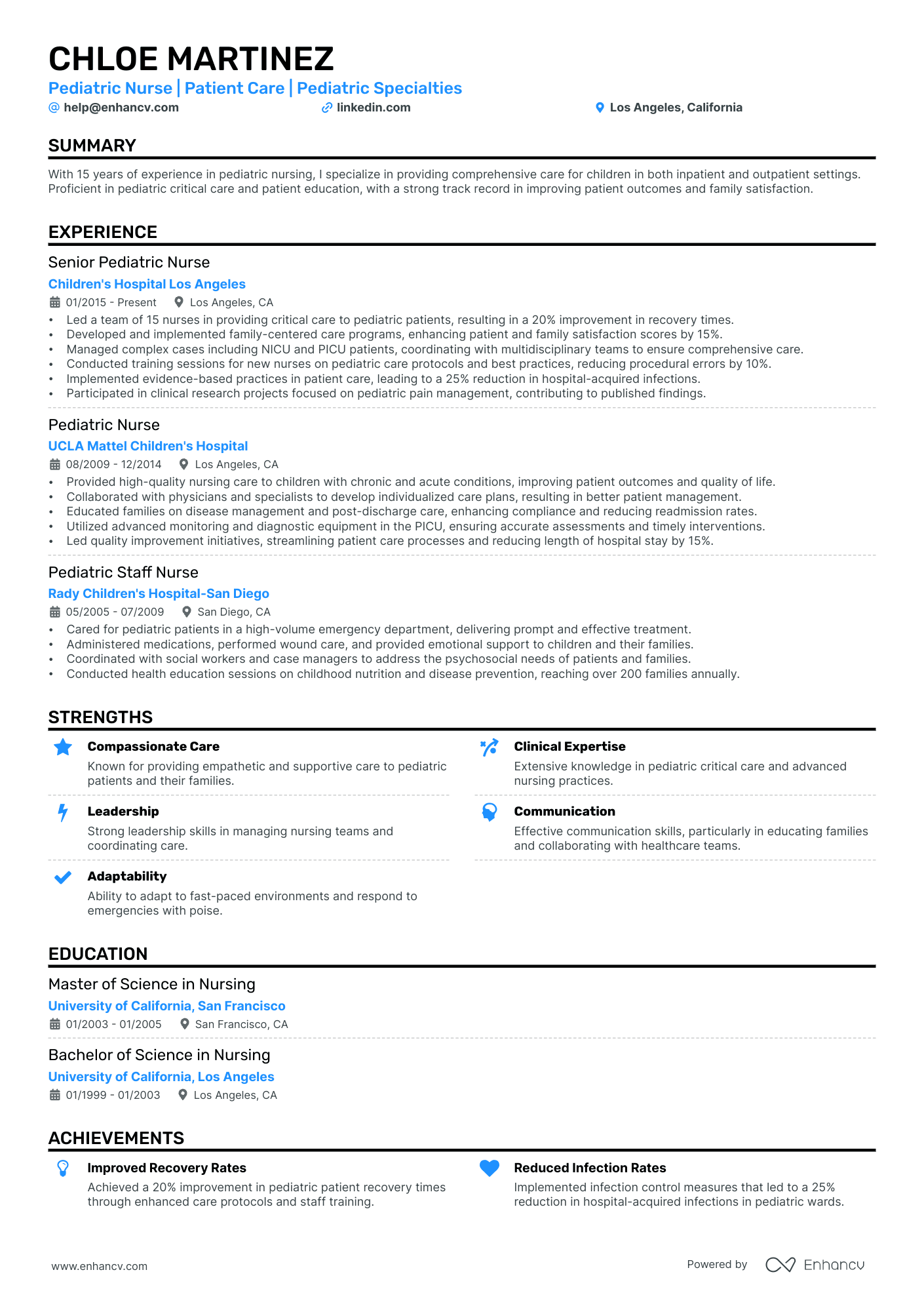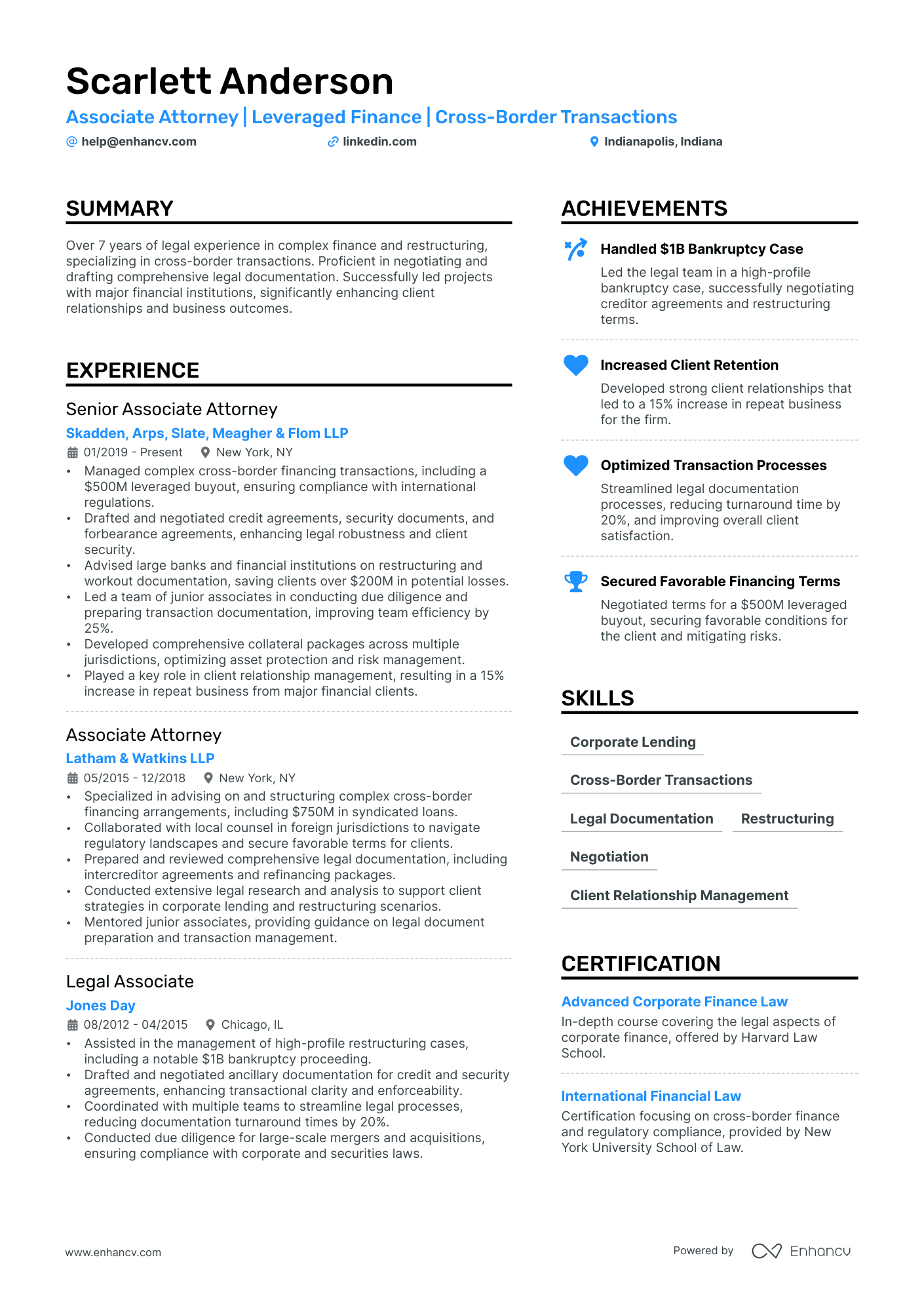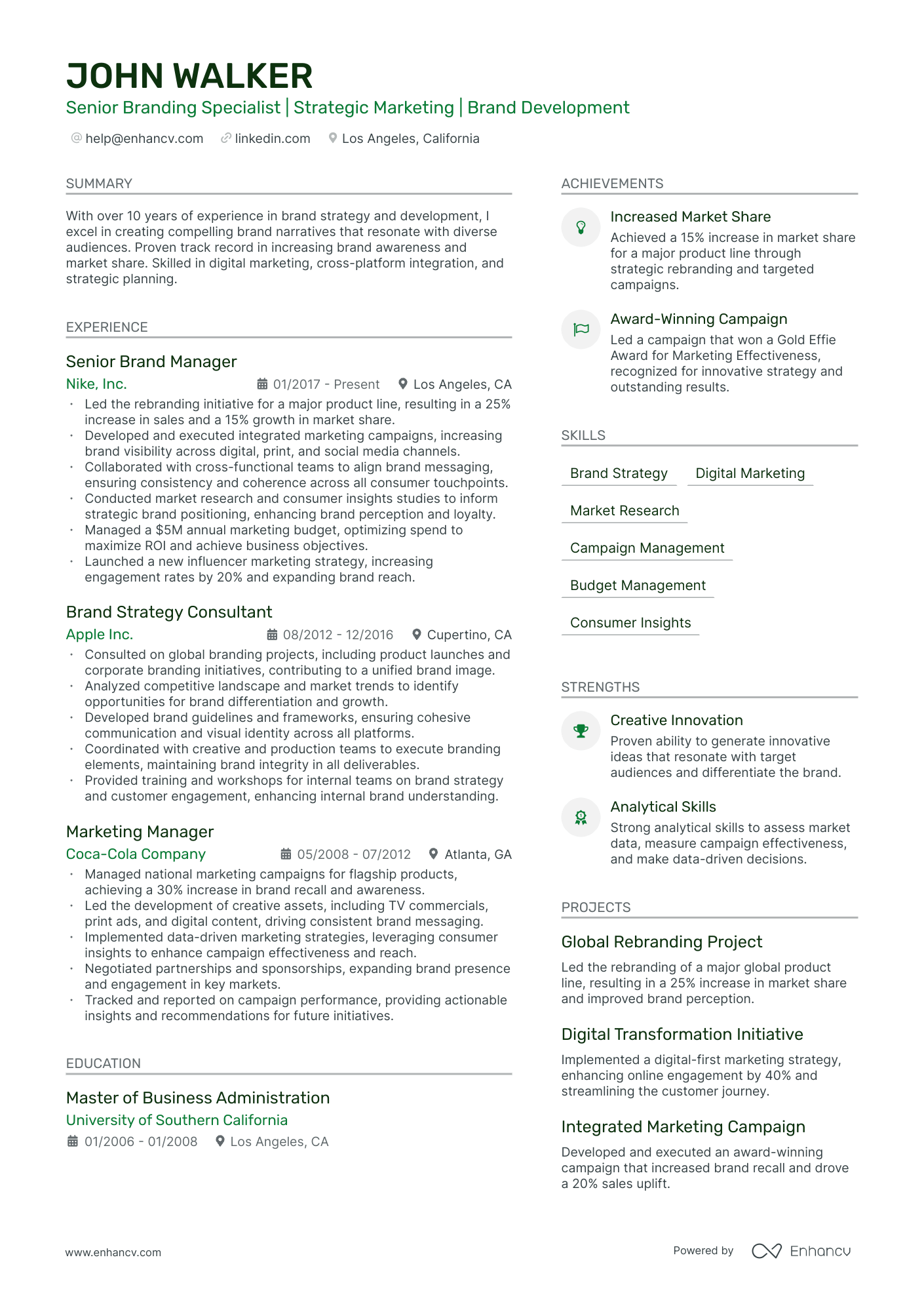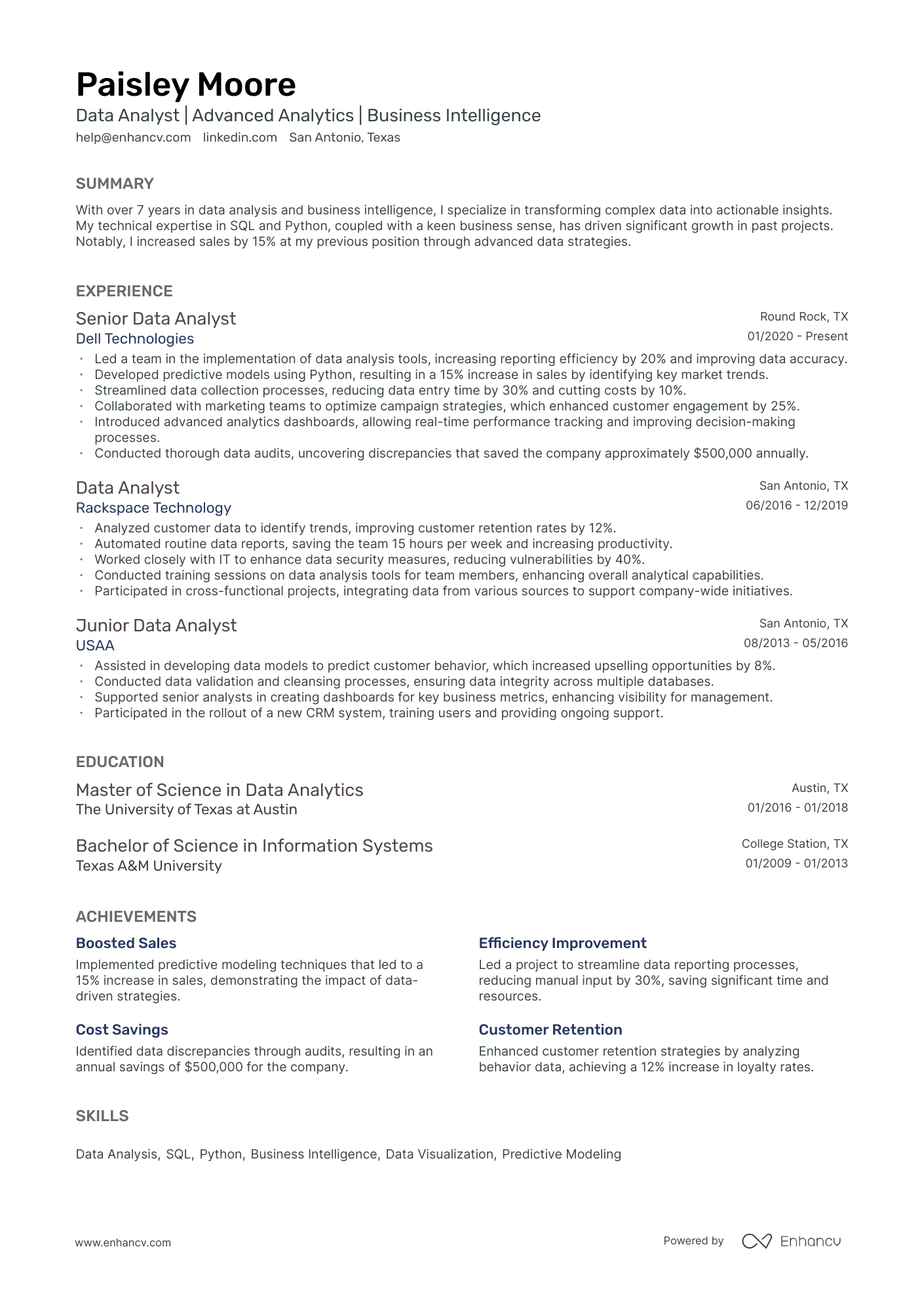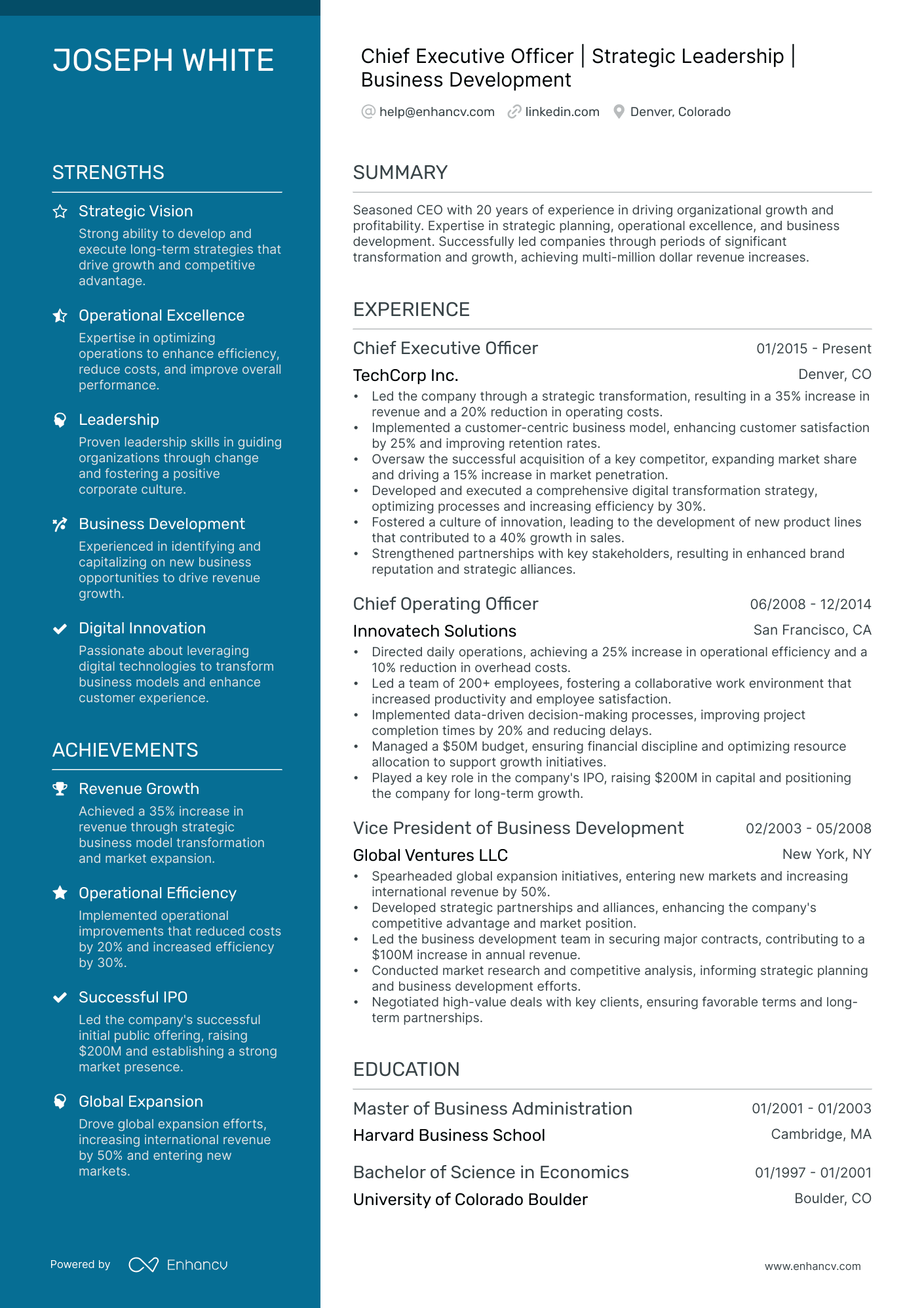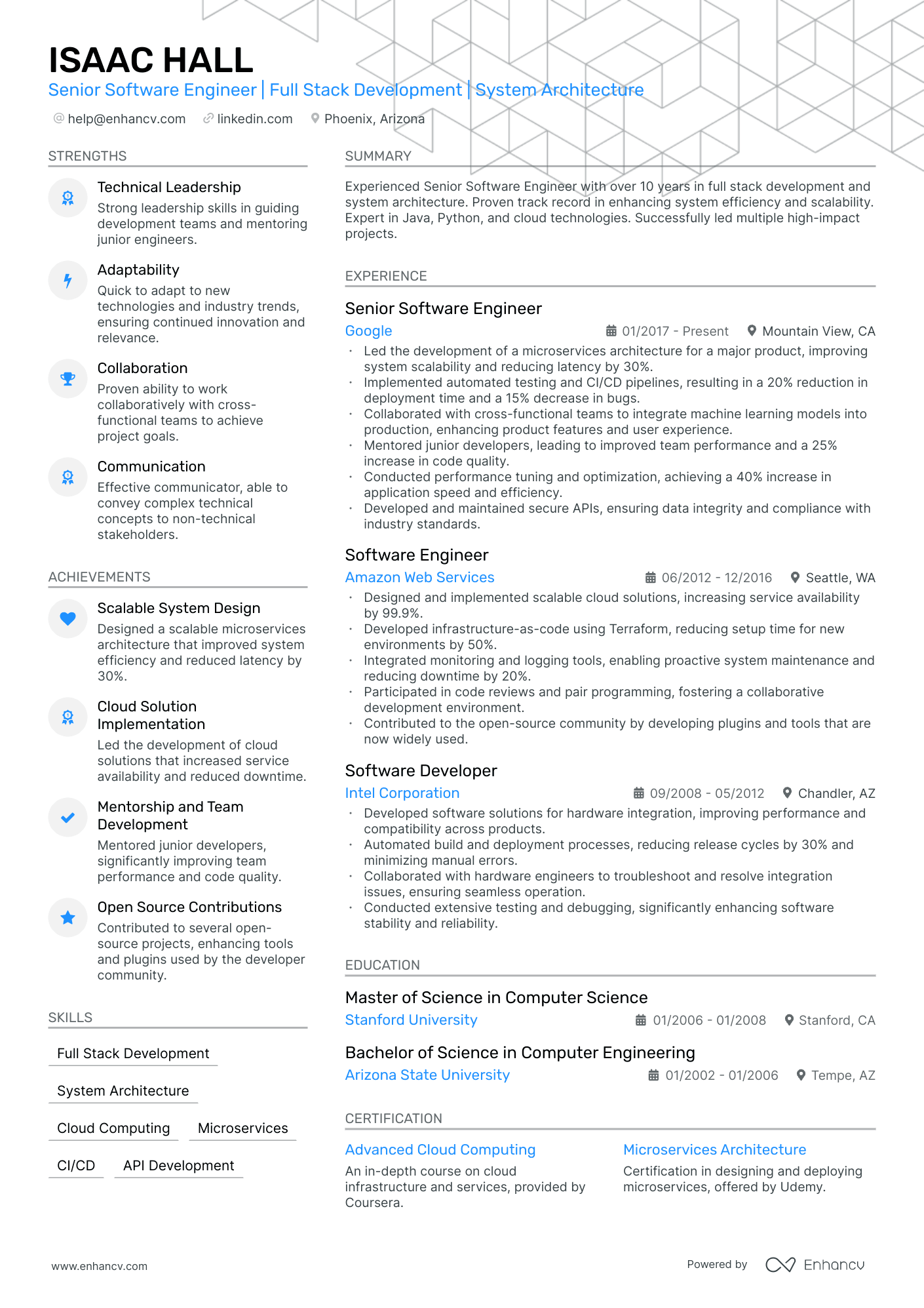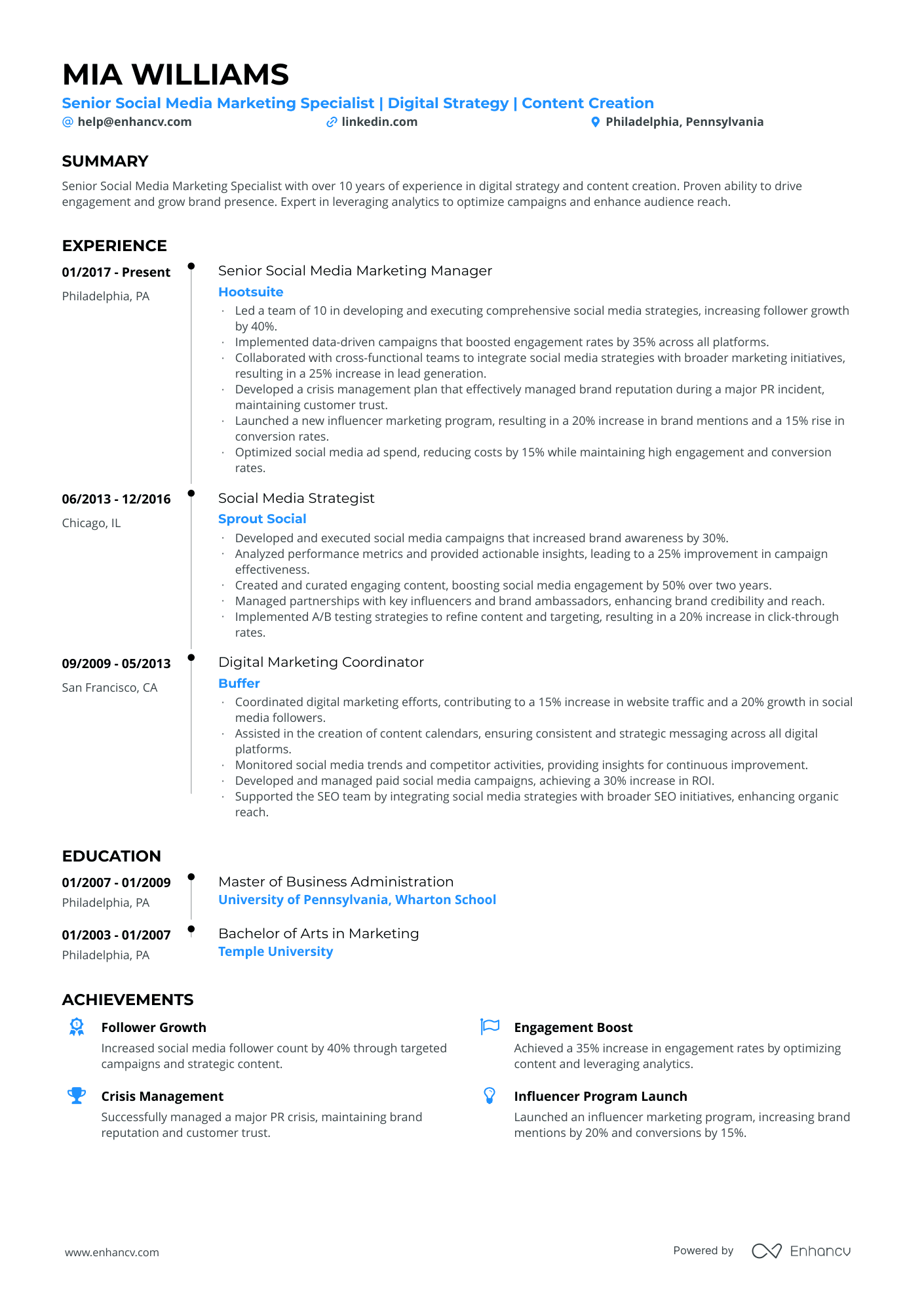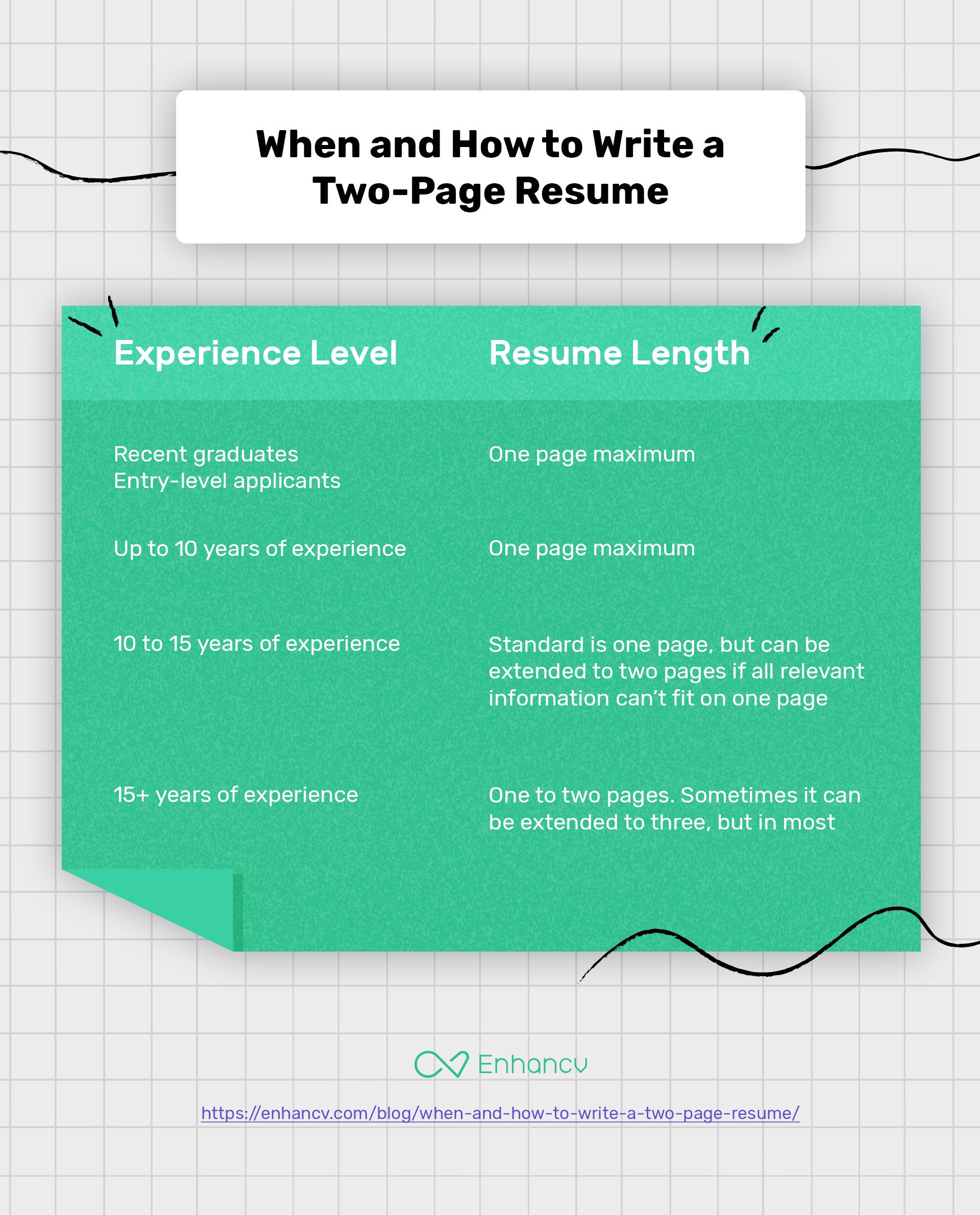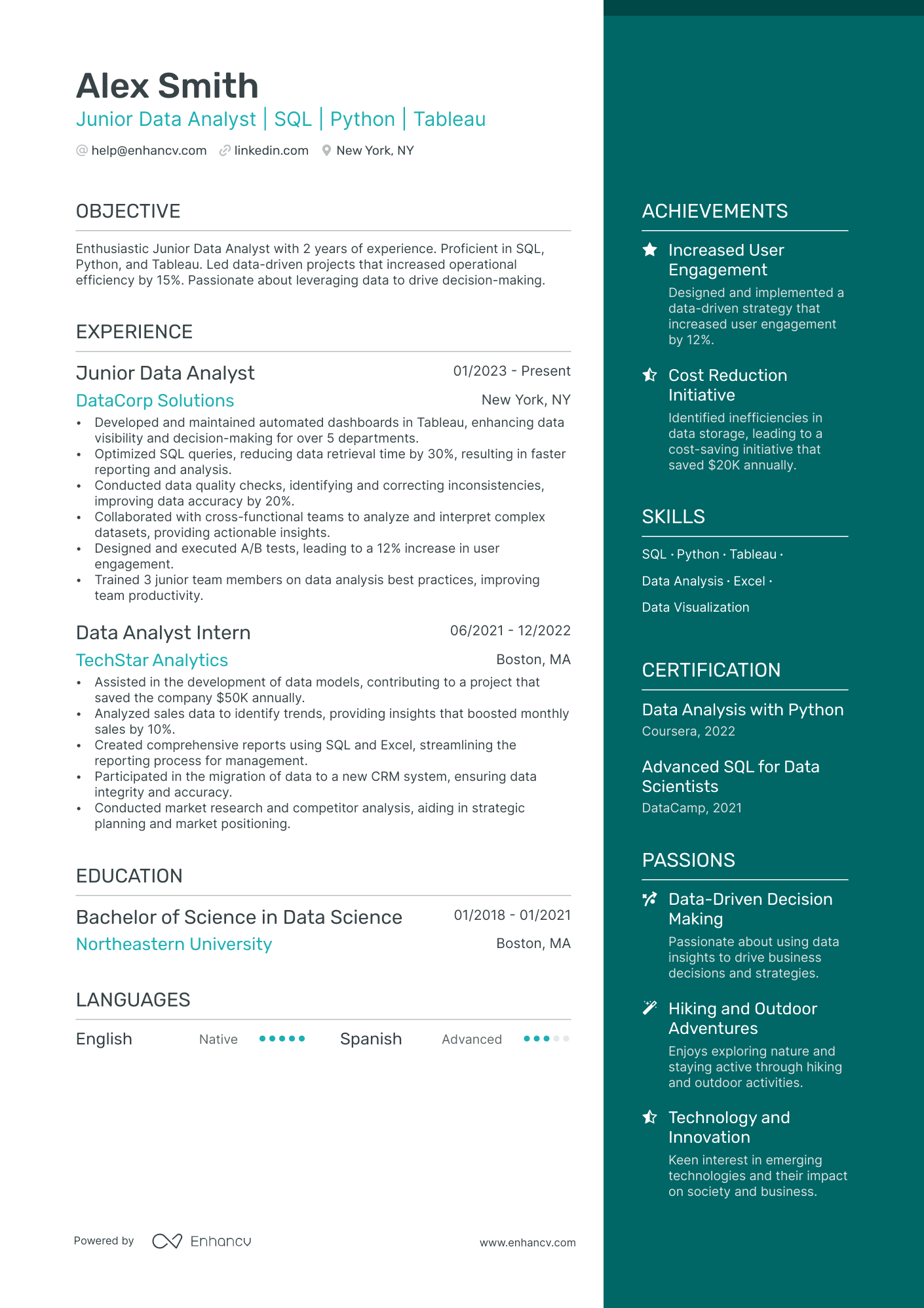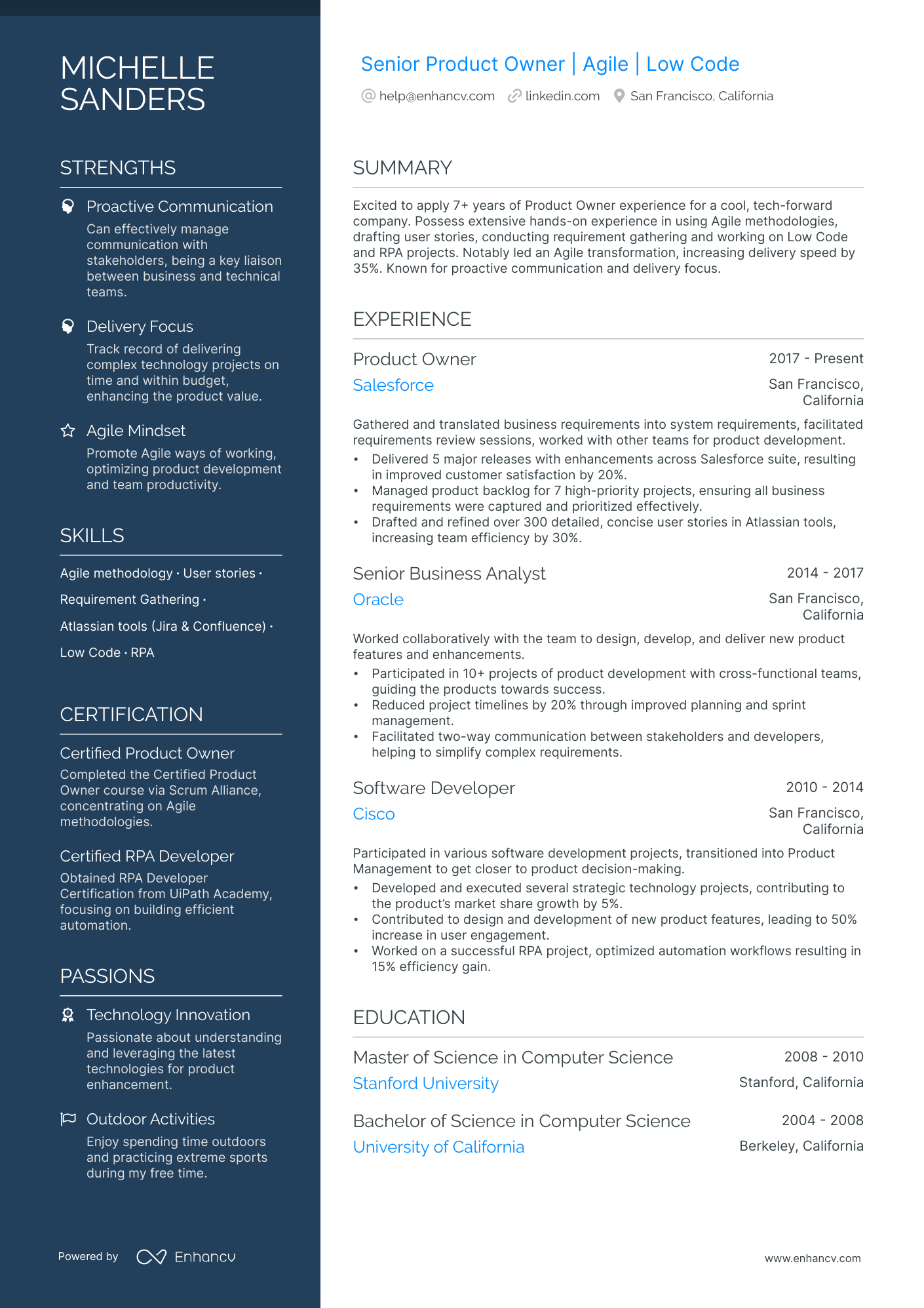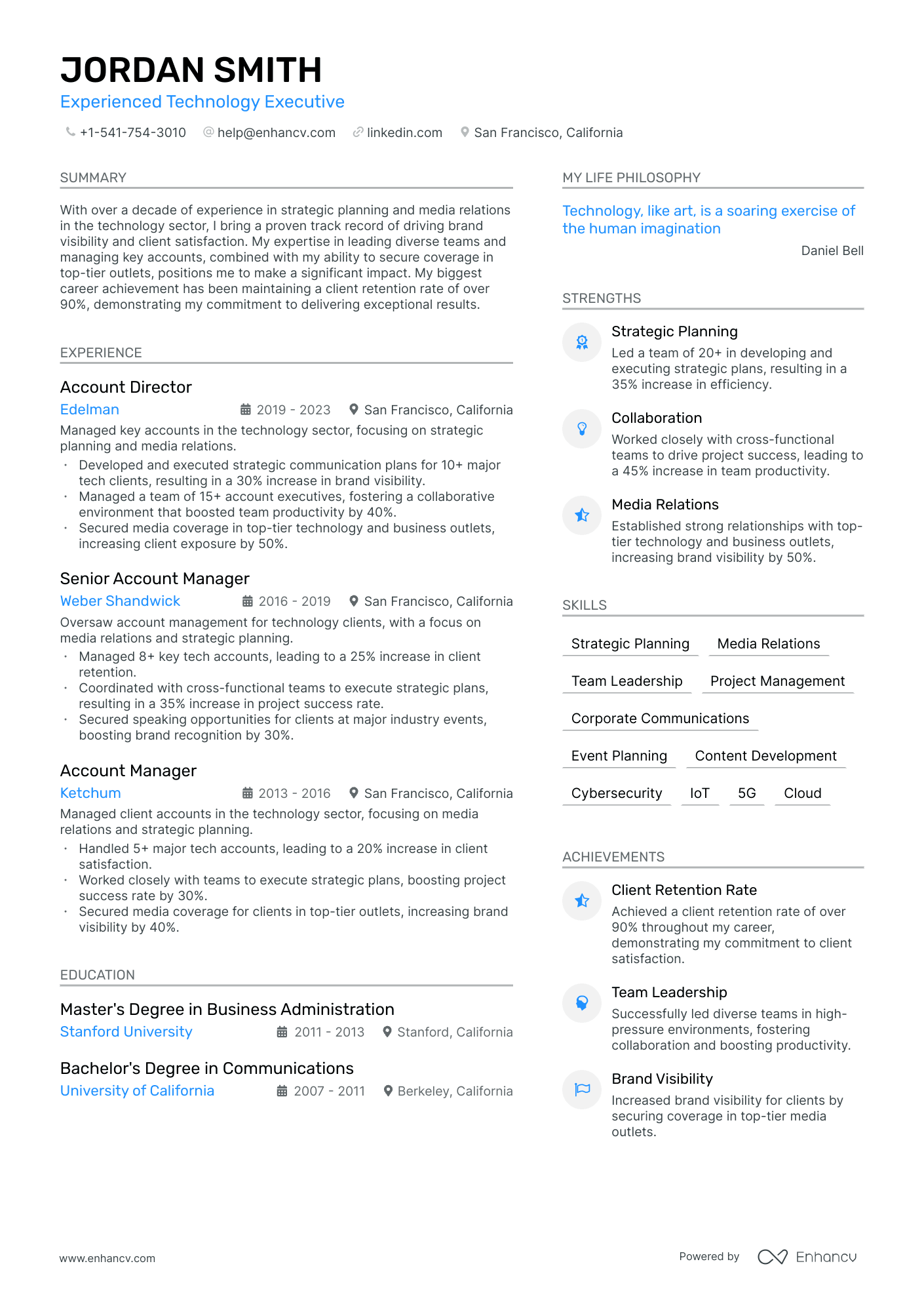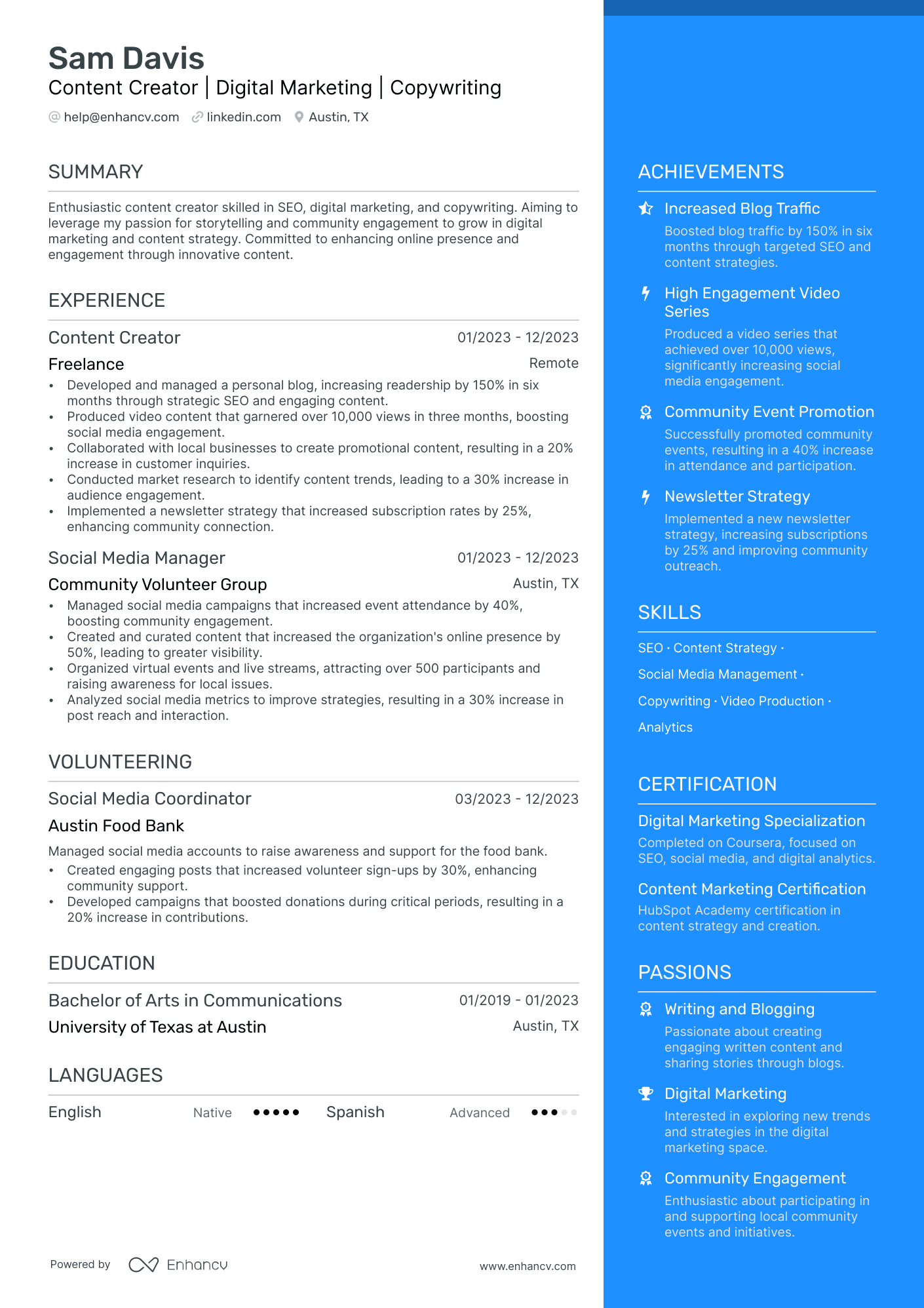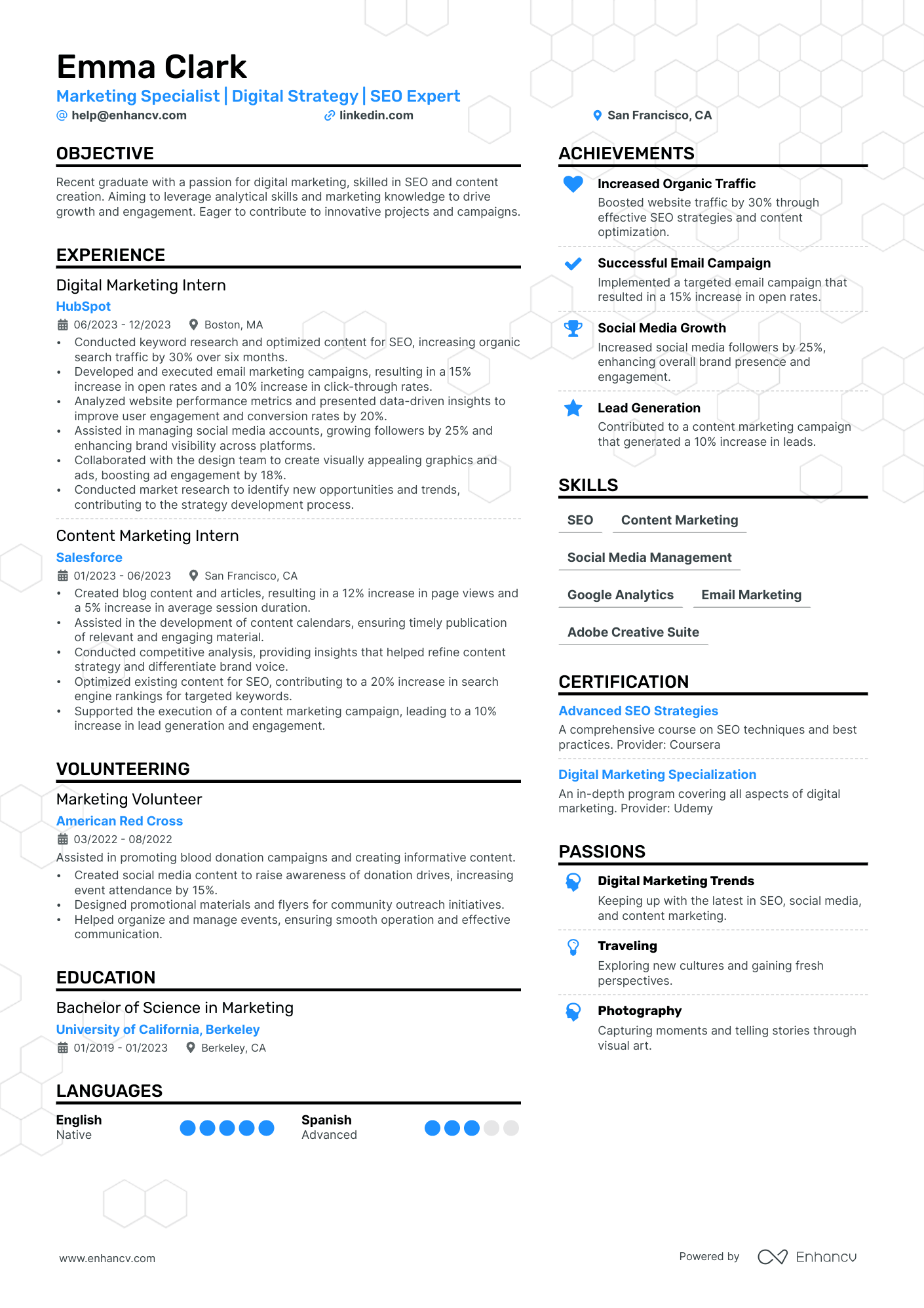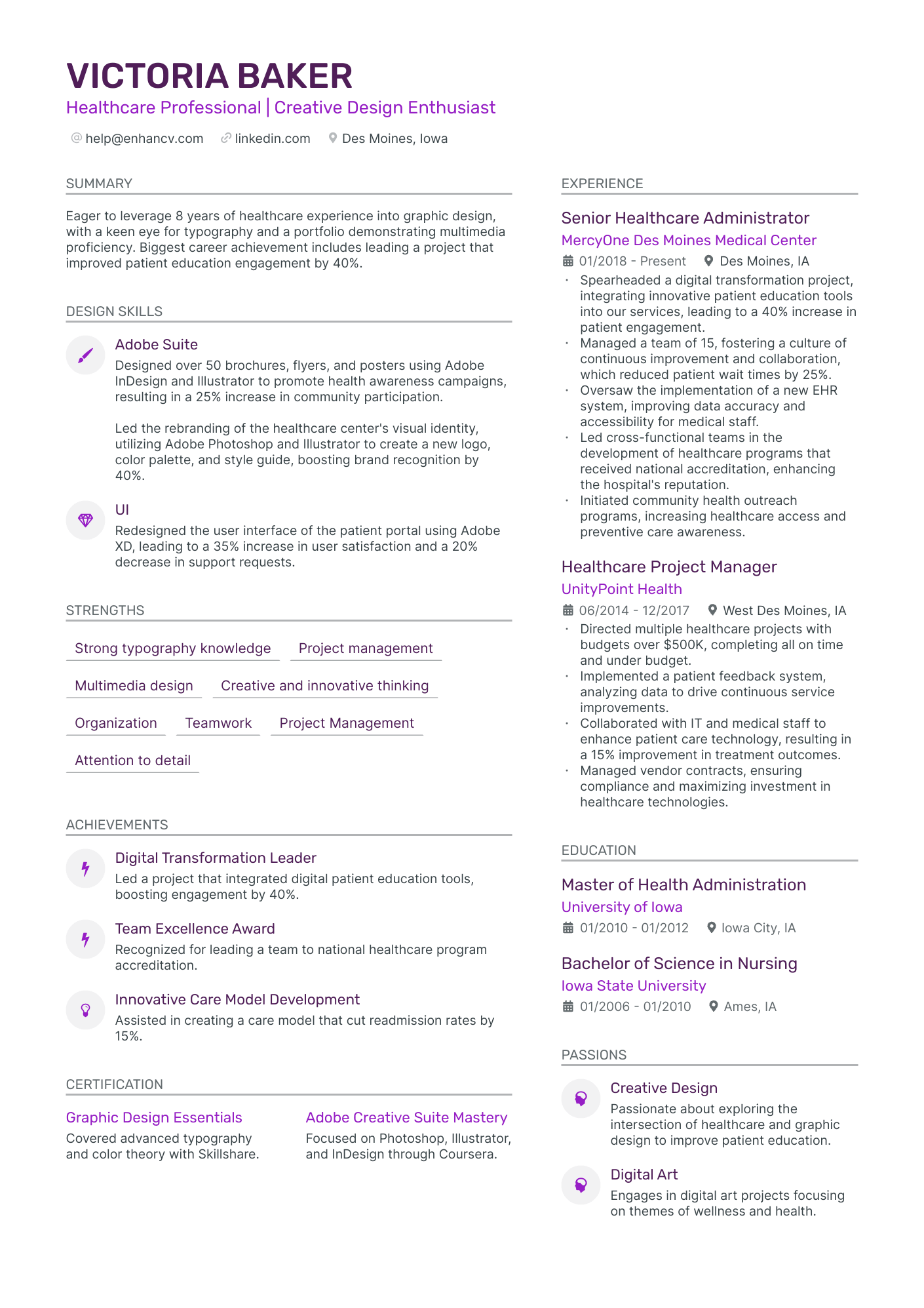You might have come across our article searching for an answer to the question, "Is it okay to have a two-page resume?" The short answer is yes, but there's more to it than just adding an extra page.
Resume length has always been a topic of debate, but a two-page resume can give you the space to highlight your value without sacrificing detail.
This guide covers when to use a two-page resume, how to make it effective, and common mistakes to avoid, with tips and examples to help you create a resume that gets results.
Key takeaways
- A two-page resume is appropriate for professionals with over 10 years of experience, leadership roles, or extensive achievements.
- Use the first page to highlight your most significant skills, achievements, and qualifications.
- Avoid using a two-page resume if you have limited achievements.
- Optimize your two-page resume for ATS by using keywords and clear formatting.
- Tailor your resume to the job by prioritizing keywords and quantifiable achievements.
Can a resume be two pages?
How long is a resume supposed to be? The answer varies depending on your experience and industry.
While one-page resumes are often recommended for those early in their careers or with limited experience, a two-page resume can be entirely appropriate for many professionals. If you have a substantial amount of work history, skills, and accomplishments, a two-page resume allows you to feature these elements without sacrificing detail.
This is important in fields that require detailed project descriptions, publications, or a comprehensive list of technical skills. The key is to ensure that every word on your resume adds value and is relevant to the position you're targeting.
PRO TIP
Focus the first page of your two-page resume on your most significant achievements and qualifications. Use the second page for additional details like projects and volunteer work. Include quantifiable results to stand out, and avoid using personal pronouns for a professional tone.
How far back should a resume go?
That’s the logical question to ask yourself after learning that a resume can be two pages. Typically, it's best to include your most recent 10 years of experience, focusing on roles that are most relevant to the job you're after.
If you have older experiences that are particularly impressive or relevant, it’s okay to include them, but don’t feel the need to list every job you’ve ever had. The goal is to underscore your career growth, skills, and achievements clearly and concisely, without overwhelming the recruiter.
Tailoring your resume to the job you’re applying for helps keep it concise and impactful.
Who should use a 2-page resume?
If you're considering a two-page resume, here are some situations where it might be a good fit:
- Professionals with over ten years of experience: A two-page resume provides space to showcase their career progression, roles, and key achievements, offering a clear picture of their substantial work history.
- Applicants with extensive accomplishments, roles, certifications, and skills: For those with numerous achievements and specialized qualifications, a two-page resume ensures all critical details are covered, which is especially valuable in technical or certification-heavy fields.
- People seeking government positions: Government roles often require detailed work histories and qualifications. A two-page resume meets these demands, presenting a thorough and authoritative account of relevant experience and skills.
- Senior management showcasing leadership roles: For executives, a two-page resume underlines leadership roles, such as team oversight, budget management, and strategic successes, effectively demonstrating their impact and readiness for top-level positions.
When to write a 2-page resume
A two-page resume offers several advantages, including the ability to include more phrases and keywords relevant to the job description, which improves the chances of passing ATS-systems used by many employers. Additionally, it allows you to provide detailed explanations of your roles, projects, and achievements, giving potential employers a clearer understanding of your skills and contributions.
Consider writing a two-page resume in the following situations:
- If you have over ten years of experience or multiple roles across companies, a two-page resume allows for a detailed account of your career progression, including key achievements and responsibilities.
- For high-level positions, a two-page resume is essential for showing leadership experiences, strategic initiatives, and major contributions, highlighting your suitability for executive roles.
- If you're changing careers, a two-page resume helps connect your past experiences to the new field, demonstrating how your skills and knowledge apply to the new career path you’ve chosen.
- For those with extensive freelance or consulting work, a two-page resume allows for detailed descriptions of various projects, client work, and outcomes, showcasing a broad range of expertise and flexibility.
- If you have many professional achievements, such as awards, publications, or volunteer experiences, a two-page resume gives these accomplishments the space they deserve, adding depth to your application.
- In some sectors, a longer resume is standard or expected. A two-page format ensures all relevant qualifications and experiences are presented thoroughly.
Industries where a two-page resume is a good idea
In some fields, a two-page resume is preferred for providing detailed descriptions of skills, projects, and achievements. Here are industries where this format can be particularly effective for demonstrating your qualifications and career accomplishments.
- Supply Chain and Logistics
- Sales
- Marketing
- Computer Science
- Engineering
- Project Management
- Finance & Administrative
- Accountancy
- Biotechnology
- Data Analysis
- Business Analysis
- Office Management
- Pharmaceuticals
- Legal
- Government
When not to write a 2-page resume
When considering a two-page document, it's essential to evaluate whether the extra space is truly necessary. In some cases, a single page is more effective in presenting your qualifications clearly and concisely. Here are some situations where sticking to a one-page resume is the better choice.
- Including irrelevant details, such as hobbies or outdated skills, can clutter your resume and detract from your qualifications. It's essential to focus on skills and experiences that directly relate to the job you're applying for, ensuring that your resume is clear and impactful.
- A resume that ends with just a few lines on the second page can appear unprofessional and poorly organized. It's more effective to condense the content onto one page, making sure that each section is complete, relevant, and visually appealing, which helps to maintain a professional presentation.
- With less than 10 years of experience, it's usually possible to summarize your professional achievements, education, and skills within a single page. This approach provides a concise and targeted overview that highlights your qualifications without overwhelming the reader with too much information.
- For internships or entry-level positions, employers generally expect candidates to have limited experience. A one-page resume is ideal for displaying your educational background, relevant coursework, internships, volunteer work, and any part-time jobs. This format allows you to present yourself as a well-rounded candidate, even with a shorter work history.
- When you have a shorter work history, a one-page resume is effective in emphasizing your most relevant experiences and skills. This format avoids unnecessary filler and ensures that the information you present is concise and impactful, helping to make a stronger impression on potential employers.
- If you don’t have enough substantial achievements to justify a second page, it's better to stick with a single page. This approach ensures that the content remains strong and impactful, rather than diluting your qualifications with filler material.
How to keep a two-page resume concise
When applying to roles, prioritizing brevity and clarity is crucial for making a strong impression. A concise, well-organized resume helps highlight your most relevant achievements and skills effectively. Here’s how to keep your two-page resume focused and to the point:
- Avoid redundancy and unnecessary details.
- Emphasize impactful results and accomplishments.
- Use clear, concise language.
- Structure your resume with headings and bullet points.
- Include only valuable sections and avoid filler.
Resume templates
Two-page single column
Two-page double column
Modern
Classic
Corporate
Infographic
Timeline
How to format a two-page resume
Choosing the right resume format is crucial for a two-page resume, as it determines how your experience and qualifications are presented. Each format—chronological, functional, and combination—offers distinct advantages that can help you effectively highlight your strengths and tailor your resume to different career stages and objectives.
- The chronological format lists work experience in reverse order, ideal for those with a clear career path. The first page covers recent roles and achievements, with earlier work history and education on the second page.
- The functional format underlines skills and qualifications rather than work history, which makes it suitable for those with gaps or career changes. It groups skills into categories and includes a brief work history summary on the second page.
- The hybrid format combines chronological and functional elements. It features a career summary and recent positions on the first page, with detailed skills and earlier roles on the second page.
Regardless of the format you choose, maintaining clarity and organization is crucial.
- Start with a header that includes your contact information, such as your name, phone number, email address, and LinkedIn profile. This should be easy to find and read.
- Follow with a resume summary on the first page that highlights your most relevant skills, years of experience, and key achievements. This summary sets the tone for the rest of your resume.
- For work history, list recent roles and significant accomplishments on the first page, using bullet points for clarity. The second page should continue with earlier positions, as well as additional relevant details.
- Include a skills section to showcase your capabilities, whether you’re using a chronological, functional, or combination format. Highlight both technical skills and other relevant qualifications.
- Incorporate education and professional development, listing your degrees, certifications, and any additional training. This shows your commitment to ongoing learning.
- Consider optional sections such as volunteer work or awards to further demonstrate your dedication to your field. By following these guidelines, your two-page resume will be well-structured, clear, and impactful, effectively showcasing your qualifications and career wins.
Choosing a one-page or two-page resume based on experience
Eager to see some real one and two-page samples? Examining the following practical ones can provide valuable insights into organizing content and guide you in creating an impactful resume.
Junior resume example
Just starting out in your career? It can be challenging to secure that first interview. Avoid cramming your resume with every experience you've had. If you have less than five years of experience, a one-page resume is ideal. Focus on showing the most relevant skills and experiences for the job you're pursuing.
Senior resume example
With a solid foundation of experience, your resume should highlight key achievements and leadership roles. Focus on projects where you made a significant impact, such as improving processes or driving growth. A two-page resume is acceptable, as long as each detail is relevant and demonstrates your contributions in previous roles.
Executive resume example
At the executive level, your resume should showcase your leadership and strategic accomplishments. Emphasize major achievements like driving growth or leading large teams. It's okay for your resume to be detailed and extended to two pages, provided each point clearly illustrates your leadership abilities and results.
Intern resume example
Applying for an internship? Your resume should highlight your education, relevant coursework, and any extracurricular activities that demonstrate your skills. Keep it to one page, emphasizing technical skills or projects that align with the internship. The goal is to show your potential and enthusiasm for learning and contributing.
Entry-level resume example
When you’re just starting your career, it’s tough to score a job interview. But a mistake all newbies make is they’ll put on every piece of experience they’ve had in their life.
You have to understand that recruiters are busy people, so if you have less than five years of professional experience, you should keep your resume to a single page. Omit anything that isn’t valuable to the recruiter and relevant to the position you’re applying to.
Career change resume example
Switching careers? A well-crafted resume can ease the transition. Highlight transferable skills and relevant experiences that prepare you for the new direction. Tailor your resume to emphasize skills and achievements pertinent to the new field. A one-page resume is typically sufficient, but if needed, a two-page resume can be appropriate if it helps clarify your qualifications.
The role of additional sections in a two-page resume
Additional sections on a resume are crucial for showing personality and experiences that can set you apart from other candidates. These sections allow you to underscore aspects of your background that might not be fully captured in the standard work experience and education sections.
At Enhancv, we like real-life examples, so let’s take a closer look at Sam’s resume who stood out among 20,000 candidates applying for the same position at Spotify. Sam did one of the most amazing things you can do with your resume. She prominently featured her core experience on the first page, complemented by a powerful summary and a daring section about how she spends her time.
On the second page, Sam expanded her experience section with relevant, though not essential, details. To ensure the second page remained impactful, she included her favorite books and cooking skills. This approach was both daring and memorable, adding a personal touch that resonated with the employer.
Just like Sam, you can add some flair to your resume. Here are some additional sections that can help enhance your resume:
- Projects: Write specific projects you've worked on, detailing your role, the skills you utilized, and the outcomes achieved.
- Publications: Include any articles, research papers, or reports you've written.
- Language skills: List any languages you speak, along with your proficiency level.
- Volunteering: Describe your volunteer work, emphasizing how these experiences have developed skills or provided insights relevant to the job you're applying for.
Tips for writing a two-page resume
Get ready to dive into some practical tips for crafting a two-page resume. Let's make your application a powerful tool for your job search!
Keep the resume header on both pages
When you can’t fit your resume on a single page, it’s best to treat the second page as a continuation of the first. You should keep the same header on the second page as you have on the first one.
Most likely, you’re well aware that recruiters are a very busy bunch. By making sure your name and contact information are present on both pages, you’re making things easier for them.
Make sure the most crucial information is presented on the first page of your resume
It’s only normal for people to pay more attention when they’re reading the first page of your resume. When crafting your resume, present the most important and relevant information first.
For example, your achievements and successes, supported by numbers, should always come first, followed by relevant experience, while leaving the hobby section for page two.
Include contact information on both pages
We briefly mentioned keeping the resume header on both pages. Still, to stress even more on that, we’re going to point out to keep your contact information on both pages of your resume.
In some instances, recruiters can go over a thousand resumes a week. That’s a whole lot! Make it easier for them by including your contact information in the header of both pages.
Treat the second page of your resume as a place to feature additional information
Using a two-page resume means that you have tons of relevant experience. You can push your education and hobbies on your resume’s second page, leaving the first one to wow the recruiters.
If you want to include a degree or some other education on your first page, you can do so in the summary section. We’ve made a pretty detailed guide on building a powerful summary, so go give it a read!
The role of cover letters with two-page resumes
Cover letters play a vital role even with a two-page resume. They offer a unique opportunity to introduce yourself, explain your interest in the position, and highlight key aspects of your experience that align with the job. While a resume outlines your qualifications, a cover letter allows you to tell your story, demonstrating your enthusiasm and fit for the role.
A well-crafted cover letter can complement your resume by elaborating on specific achievements or projects that are particularly relevant to the job. It also provides a chance to explain any career transitions or gaps in your employment history in a positive light. Essentially, the cover letter sets the stage for your resume, making your application more personalized.
Frequently asked questions about 2-page resumes
Is it okay to have a 1.5-page resume?
Yes, but not shorter than that. When you’re using two pages to present your experience, it’s essential to put in the effort and fill the second page at least halfway. There’s nothing more unprofessional than a two-page resume with only two sentences on the second page (I mean, you could’ve easily made some parts shorter to fit everything on a single page).
If you can’t seem to quite fill the page, then you can use some of Enhancv’s unique sections that can show a bit more about you.
Should a two-page resume be double-sided?
No, a two-page resume should not be double-sided. Each page should be printed on a separate sheet of paper. This makes it easier for employers to read, review, and organize your application materials. It also ensures that if pages get separated, the information on each page remains clear and accessible. Additionally, most modern job applications are submitted electronically, so ensure your document is formatted for digital viewing with clear pagination.
Should you staple or paper clip the resume?
When stapled, it can be not very pleasant to read, and if handled improperly, it can result in a tearing of the pages.
What's the ideal spacing for a resume?
It’s advisable to use 1.0 to 1.15 line spacing for the main text to ensure readability. Keep margins between 0.5 and 1 inch, and add consistent spacing between sections, around 10 to 12 points, to create a clean, professional look.
Make one that's truly you.

